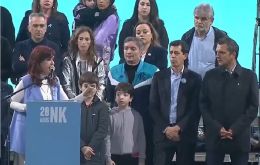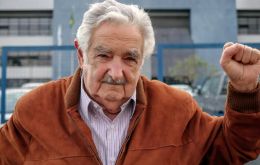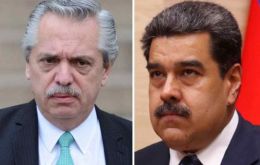MercoPress. South Atlantic News Agency
Tag: Cristina Fernández de Kirchner
-
Wednesday, May 8th 2024 - 10:45 UTC
CFK says Milei plans to instate a 21st-century colonialism

Former Argentine President Cristina Fernández de Kirchner (CFK) admitted Tuesday during an event at the headquarters of the Instituto Patria in Buenos Aires that she was “not a feminist” and drew mixed reactions from her followers.
-
Tuesday, February 27th 2024 - 10:58 UTC
Prosecutor wants CFK sentenced to 12 years in corruption case

An Argentine Prosecutor Monday requested that former President Cristina Fernández de Kirchner (CFK) be sentenced to 12 years in jail for her alleged involvement in a corruption case going through its appeal phase. CFK has already been sentenced to six years in Dece. 2022 in addition to her lifelong political disenfranchisement. Since leaving office as Vice President on Dec. 10, CFK has no legal immunity.
-
Friday, February 16th 2024 - 10:57 UTC
CFK warns of Argentina's third debt crisis

Former Argentine two-time President Cristina Fernández de Kirchner (CFK) described Javier Milei as a “showman-economist in the [Casa] Rosada.” In a 33-page document released on St Valentine's Day, CFK also spoke of the incumbent head of state's “failed officials” and warned that dollarizing the country's economy “would mean losing forever the possibility of development.”
-
Monday, December 11th 2023 - 10:33 UTC
Cristina Kirchner makes a 'fuck you' and steals spotlight at Milei's inauguration

Despite not being the focal point of the day, former Vice President Cristina Fernández de Kirchner stole the spotlight during Javier Milei's inauguration as the new President of Argentina, with a series of gestures that drew attention. Among them was a particularly unusual move as she entered the National Congress at noon.
-
Wednesday, November 29th 2023 - 09:31 UTC
Buenos Aires Court rulings go Macri's way

Separate court rulings issued Tuesday in Buenos Aires seemed to accommodate former President Mauricio Macri's agenda, thus heralding the times to come after Javier Milei's Dec. 10 inauguration.
-
Monday, July 10th 2023 - 10:42 UTC
Argentina: First segment of President Néstor Kirchner gas pipeline inaugurated

In an event marking togetherness within the ruling Unión por la Patria front ahead of this year's presidential elections, the first segment of the President Néstor Kirchner gas pipeline was inaugurated Sunday in Salliqueló, in the province of Buenos Aires.
-
Thursday, May 25th 2023 - 21:43 UTC
Argentina's presidential elections: CFK did not say it, but she showed it

By Mordechai Taji
Argentine Vice President Cristina Fernandez de Kirchner (CFK) did not announce on Thursday anyone's candidacy - hers or not - for this year's elections. She did not do it with her voice. But by her side were her son, Deputy Máximo Kirchner, Interior Minister Wado De Pedro, and Economy Minister Sergio Massa. It was a visual message: two of those three will most likely be on one of the tickets to be presented in the primary, mandatory, simultaneous, and open elections (PASO). She also confirmed that she would not run and frustrated the hopes of some unconditional faithful, who expected her to change her mind. -
Sunday, April 30th 2023 - 09:46 UTC
Argentina needs a way out of the dollar gamble, Mujica says

Former Uruguayan President José “Pepe” Mujica said Argentines have long lost confidence in their currency; hence the jump of the “blue” (a euphemism for “black market”) dollar.
-
Friday, September 2nd 2022 - 02:14 UTC
Attempted assassination: man who tried to shoot Cristina Fernandez de Kirchner arrested

A Brazilian man was arrested on Thursday in Buenos Aires after attempting to shoot Argentine Vice-President Cristina Fernandez in the vicinity of her home, when a vigil was being held in her support, as confirmed to the press by the country's Security Minister, Anibal Fernandez. The president of Argentina, Alberto Fernandez, declared a national holiday for Friday and said: “This event is extremely serious, it is the most serious that has happened since we have recovered our democracy.”
-
Thursday, June 30th 2022 - 20:11 UTC
HRW criticizes Argentine President for his softness regarding Venezuela

Argentine President Alberto Fernández has been heavily criticized by Human Rights Watch (HRW) for his stance regarding Venezuelan leader Nicolás Maduro and his government's unclear record in that regard.
